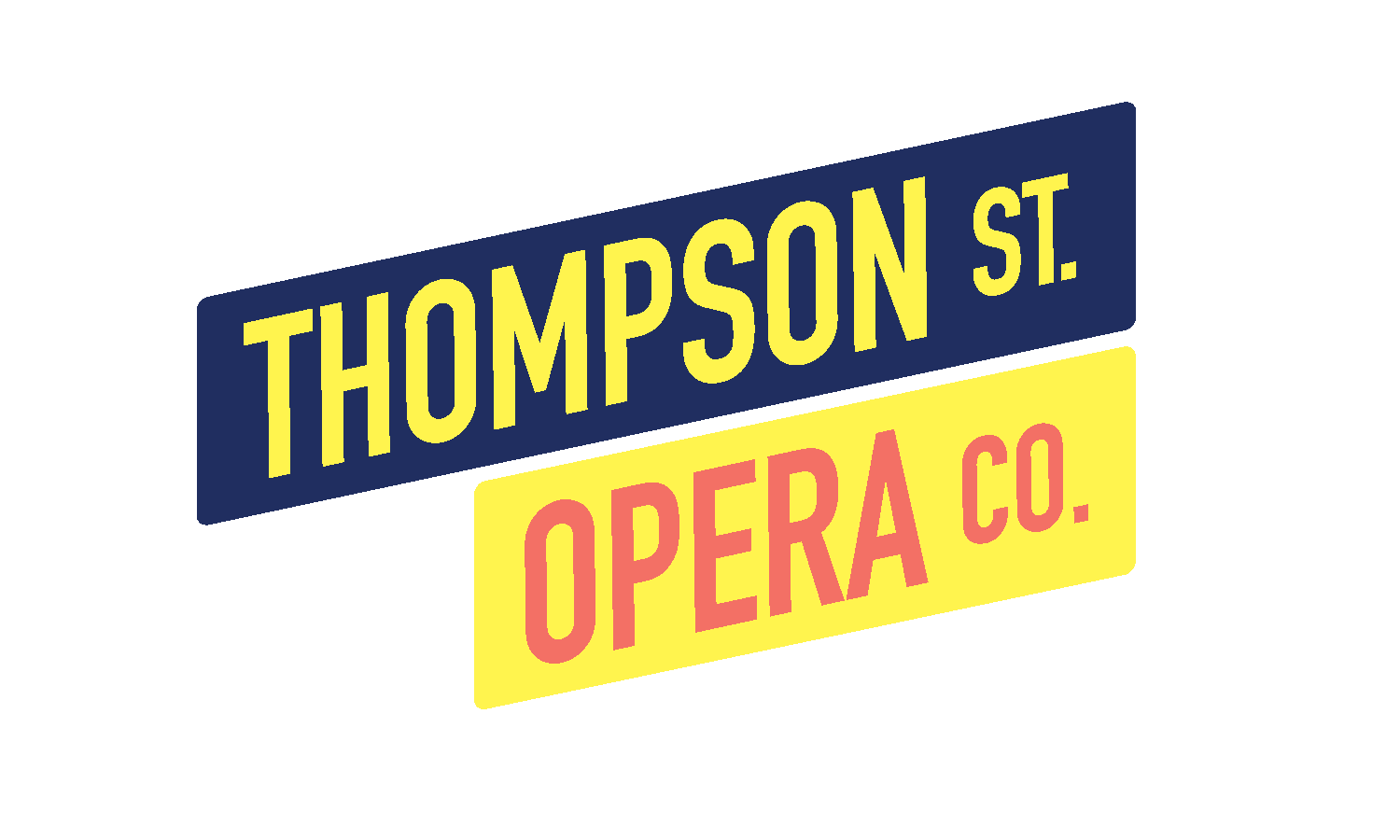A Letter from the Executive & Artistic Director
Dear world,
My name is Claire DiVizio, and I’m the founder of Thompson Street Opera Company. You might know that we are a storefront opera company in Chicago that produces new works by living composers. What you may not know, is that we are also a queer- and trans-led company, with more than half of our board identifying as part of the LGBTQIA+ community. While this has always been true, we haven’t always made it a vocal part of our company brand. But this Pride Month, in the midst of historically catastrophic anti-trans and anti-queer national rhetoric, we feel that it is important to be publicly out and proud.
We wanted to take this moment to clearly and unequivocally affirm that Thompson Street Opera Company is not only a safe space for LGBTQIA+ artists, but one that intentionally lifts up queer and trans artists, voices, and stories. We don’t just program works about queer people; we choose works by queer composers writing about their own identities. We hire performers and directors who share the identities of the characters they’re bringing to life. And, we are intentional about making all of our processes safe and affirming for those queer artists.
Opera is a notoriously conservative art form both on and off stage. When I founded Thompson Street Opera Company, I was also pursuing a professional classical singing career. I am a genderqueer trans person, and while I’ve only been on testosterone for about a year, I have been publicly out in my working life since 2017. Few companies asked for my pronouns, and only a couple individuals actually used them. As a soprano, I was prepared to play feminine women onstage, but it was made explicitly clear to me that I was also expected to dress and behave hyper-femininely in auditions, rehearsals, and at donor events. One director even went so far as to say that I should buy a wig to wear to auditions because my short hair was “too butch” and “didn’t reflect the kind of roles that I wanted to be considered for.”
I was prepared to play a character onstage; I was not willing to play one every moment of my working life.
I have spoken to countless singers, queer and straight, who have similar stories. Large operatic institutions are painfully slow-moving and institutional systems prevent progress on any kind of scale to take place. The beauty of Thompson Street Opera Company is we were created in response to these structures instead of by them; we have built in progressive policies from our founding, and our administrative structure allows us to respond quickly to adjust our practices as necessary.
In 2021, we worked with our Equity Committee to create a company handbook which not only codified our anti-discrimination policies, but also fleshed out our values as an organization and how those values would be translated into a company culture through action and practice. In addition to queer-affirming policies and cultural practices, we also adopted a stringent anti-bullying policy and a conflict resolution process based on restorative justice principles so that the type of emotionally abusive tactics that are sadly common in rehearsal rooms would have no place in ours.
Our fall 2022 production of Pedro Finisterra & Edward Einhorn’s The Boy Who Wanted to be a Robot was a moving celebration of queer neurodivergent identity. One of my favorite moments, in both the principal and cover cast, is captured below:
Here, Orgo has finally completed his transformation (or, if you want to get literal about it, his transition) with the help of his robot friends, he has become his truest self – part robot, part human, and he even chooses a new name: Cyborgo. As he emerges, the robots that surround him sing a song which is normally sung to robots on their “day of awakening.” The look on the faces of the actors (who are both non-binary trans people themselves) as this moment dawns on their character brought me to tears each night – joy so overwhelming they can barely believe it.
This is the future Thompson Street Opera Company wants both on and off stage: one in which all queer people are safe, seen, and celebrated by our friends and family.
Our June production this year, which will be performed at the height of Pride Month at the PrideArts theater, tells the story of a trans person on a journey to self-acceptance. Written by trans composer Grey Grant and starring trans singer Elektra Voyante, MICHIGAN TREES: A Guide to the Trees of Michigan & the Great Lakes Region blends folk and contemporary American classical sounds to tell the story of one person’s efforts to reconcile the differences between how people view them and how they view themself.
As a point of interest, we did not program this piece as a reaction to the increasing danger for transgender people in this country; we chose it over a year ago as part of our call for scores because we loved the music, and we loved this story’s ability to speak to the universal human need for wholeness. It now feels critically important to present this story to Chicago audiences and resoundingly uplift its transness, its queerness– not only to fulfill our mission to present the most exciting new works by living composers, but also to signal to everyone watching that we are here, we are queer, and we will not be silent.
To support our efforts, we turn to you. If you are wondering how you can show your support for the LGBTQIA+ community in opera, make a donation to our TSOC PRIDE fundraiser. Your contributions will be used by queer artists, for queer artists, to make joyful queer art– and that’s something to be proud of. #TSOCPRIDE
Claire DiVizio (they/them)
Thompson Street Opera Company
Executive and Artistic Director


